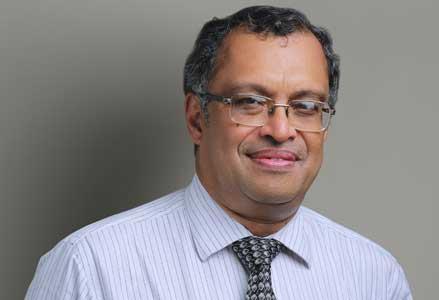|
|

|
|

| Article / Health / Neurological Disorders | Post Comments |
Parkinson's Disease - An Increasingly Common Brain Disease |
|
| By : Aster Medcity , Kochi , India 11.4.2017 Phone:0484 669 9999 Mail Now | |
| Kuttisahib Road, Near Kothad Bridge, South Chittoor, Cheranalloor, Kochi, Kerala 682027 | |

Dr. Mathew Abraham Senior Consultant, Neurologist,† Aster Medcity, Kochi.
These days, Mr. Nair is unable to enjoy his full cup of hot tea. He starts telling his story to his visitors in a slow measured voice, "I used to like to have a full cup of tea. But then I started telling my wife not to fill it to the brim as it was spilling out.' Mrs. Nair continues, 'I didn't understand at first. Then I saw that his hands were shaking a little when he was lifting the cup to his mouth. The tremors started getting worse. Our neighbour is a medical student and he asked us to see a doctor. It was then that we came to Aster Medcity, where the doctor diagnosed it as Parkinson's disease.'
Parkinson's disease, also known in India as kampavata (kampa meaning trembling or shaking) affects middle-aged and elderly persons mostly above the age of 50 years. It is characterised by twitching or tremors in the extremities especially hands and fingers while holding something or when carrying out any movement. Tremors can also occur in the legs, jaw and face. Other characteristic symptoms include a typical slowness of movement, rigidity (stiffness) of the body and problems with balance and coordination. Simply put, in Parkinson's Disease, the nerve cells in the brain, called as neurons gradually break down and die. Many of the symptoms are due to losing these neurons that produce a chemical called dopamine. When dopamine levels decrease, it causes abnormal brain activity, leading to the development of the characteristic symptoms. The cause is as yet unknown, but genetic and environmental factors may play a role. Parkinson's disease is a chronic and progressive movement disorder. It develops gradually with barely noticeable symptoms at first. In early stages, the symptoms may be just a slight tremor in a hand. The face may show very little expression, almost appearing like a mask. Unconscious or automatic movements like swinging of arms while walking may be affected. Speech may become soft or slurred. Over a period of time, as the condition progresses, the symptoms get worse. Unfortunately there is no "cure" for the condition, but on the positive side, Parkinson's disease can be managed with modern medicines. There are medications that improve the symptoms almost magically. Surgery is also an option and Deep Brain Stimulation (DBS), a standard surgical treatment for early stage Parkinson's disease has been found to help regulate the affected areas of the brain and improve the symptoms, sometimes dramatically. Due to lack of awareness of the disease, many patients go to the doctor at a later stage. The patient's family is also affected as the patient gets dependant on them. Some patients are tired of the disease and get taken in by claims of curing the condition. Patients sometimes look for miracle cures and get taken in by false promises. Many patients have suffered because of so-called stem cell replacement therapy. Stem cell therapy is still in the research phase and its efficacy has not been proved. Early diagnosis with proper treatment helps to keep the patient active and mobile with a better quality of life. Advances in diagnosis and treatment have changed the outlook for patients with Parkinson's disease. Today, a patient can look forward to a dramatic improvement in the quality of life. Even the surgical option DBS is available in last stage Parkinson's disease, where the function can be restored to a great extent after surgery. |
|